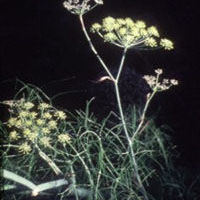Fit and Fast Recipes
Fennel
 © Steven Foster
© Steven FosterParts Used & Where Grown
The fennel plant came originally from Europe, where it is still grown. Fennel is also cultivated in many parts of North America, Asia, and Egypt. Fennel seeds are used in herbal medicine.
- Reliable and relatively consistent scientific data showing a substantial health benefit.
- Contradictory, insufficient, or preliminary studies suggesting a health benefit or minimal health benefit.
- For an herb, supported by traditional use but minimal or no scientific evidence. For a supplement, little scientific support.
Our proprietary “Star-Rating” system was developed to help you easily understand the amount of scientific support behind each supplement in relation to a specific health condition. While there is no way to predict whether a vitamin, mineral, or herb will successfully treat or prevent associated health conditions, our unique ratings tell you how well these supplements are understood by the medical community, and whether studies have found them to be effective for other people.
For over a decade, our team has combed through thousands of research articles published in reputable journals. To help you make educated decisions, and to better understand controversial or confusing supplements, our medical experts have digested the science into these three easy-to-follow ratings. We hope this provides you with a helpful resource to make informed decisions towards your health and well-being.
This supplement has been used in connection with the following health conditions:
| Used for | Amount | Why |
|---|---|---|
Colic | 1 to 4 teaspoons of a water emulsion of 0.1% fennel seed oil, up to four times per day | In one study, supplementing with fennel seed oil relieved colic in 65% of cases, compared with 24% of infants receiving a placebo. |
Colic (Chamomile, Lemon Balm, Licorice, Vervain) | 1/2 cup (118 ml) of tea up to three times daily | A soothing tea made from chamomile, vervain, licorice, fennel, and lemon balm has been shown to relieve colic more effectively than placebo. |
Indigestion, Heartburn, and Low Stomach Acidity | 1/2 tsp (2 to 3 grams) of ground or crushed seeds three times daily, taken directly or as tea | Studies have found that a combination of peppermint, caraway, and fennel is useful in reducing gas and cramping in people with indigestion. |
Irritable Bowel Syndrome | Refer to label instructions | In a double-blind trial, treatment with a proprietary product containing turmeric and fennel improved symptoms in patients with irritable bowel syndrome. |
Irritable Bowel Syndrome (Caraway Seed, Peppermint, Wormwood) | Refer to label instructions | A combination of peppermint, caraway seeds, fennel seeds, and wormwood was reported to be an effective treatment for upper abdominal complaints in one trial. |
Traditional Use (May Not Be Supported by Scientific Studies)
According to the Greek legend of Prometheus, fennel was thought to have bestowed immortality.1 Fennel seeds are a common cooking spice, particularly for use with fish. After meals, they are used in several cultures to prevent gas and upset stomach.2 Fennel has also been used as a remedy for cough and colic in infants.
Copyright © 2026 TraceGains, Inc. All rights reserved.
Learn more about TraceGains, the company.
The information presented by TraceGains is for informational purposes only. It is based on scientific studies (human, animal, or in vitro), clinical experience, or traditional usage as cited in each article. The results reported may not necessarily occur in all individuals. Self-treatment is not recommended for life-threatening conditions that require medical treatment under a doctor's care. For many of the conditions discussed, treatment with prescription or over the counter medication is also available. Consult your doctor, practitioner, and/or pharmacist for any health problem and before using any supplements or before making any changes in prescribed medications. Information expires December 2026.








